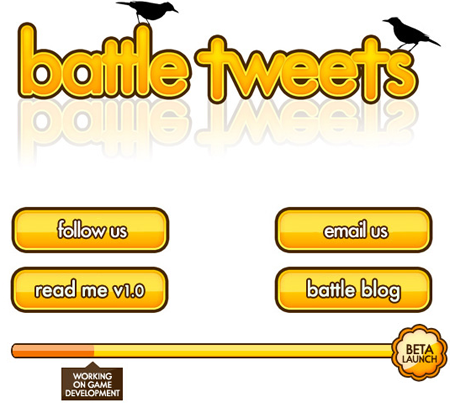Like many, I got some twam (twitter + spam) on March 20 last week pointing me to Battletweets. I didn’t follow them initially, partly because their site didn’t have any information. Now it does, so now I do … at least for a little while.

Battletweets is a group Twitter game, currently in development.
According to the FAQ, Battletweets is a team-based game for the Twitter community. There are plans to host different weekly activities, such as web scavenger hunts, pic & post, trivia, wikijam, and others. Initially, the beta release will feature two established teams the rest of the world can follow along. Winning teams earn badges, with the hint of other more substantive prizes possible as the game develops.
I have two very diverse opinions about the kind of use for Twitter that Battletweets proposes. Since it is a good news / bad news kind of thing, I’ll start with the bad:
Battletweets will produce a lot of noise.
For the same reason I think Tweet 140 is a good idea with bad consequences, my big concern with using Twitter as a platform for a game. The value of Twitter for myself and many others is primarily its ability to help members feel connected to others despite gulfs of both time and space. Each person can shape their own information stream by following only the other members they want to know about. If the noise becomes too great, they can stop following, maintaining control over their stream. When the noise becomes mixed—which includes both frequent directed conversation (@replies) and artificial content (like making a goal to use all of the available 140 characters, a twoosh or perfect tweet)—that separation goes away. People I want to or even must follow now have a split identity that cannot be separated. One is the individual whose connection is important, and the other produces high-content noise that has no relevance.
Battletweets will engage the community.
It isn’t that Twitter games are inherently bad. Minnesotan Aric McKeown has been using Twitter for a local version of Where’s Waldo, sitting in local coffee shops and tweeting clues to his whereabouts (). The Least Dangerous Game is something that would work well here in Bloomington as a means to mix online and offline, and to create awareness about local businesses and organizations. Battletweets may do some virtual-physical mixing, too, but even if it doesn’t, the games are task-based group activities open to the world. That means, people can engage on several levels, befitting their interest and available resources, and connect to people simply by paying attention to what they contribute. If Battletweets takes great care in their games to emphasize the phatic nature of Twitter—to base the games around revelations of individuals about their day-to-day identity—these games could enhance the content of the personal information stream.
What I find most compelling about Battletweets at the moment is their development process. When I first visited the site, there was a logo (with a needless reflection of the image) and two buttons, one linking to their twitter account and another with a contact email address. On my second trip, they added a FAQ and a currently-dormant link to a blog. They also have a little progress bar to show where they are in their process, a nice little use of tech culture that is very effective, provided it continues to move. With my recent fascination with startup companies, I decided to pay attention mostly for the promise of transparency.